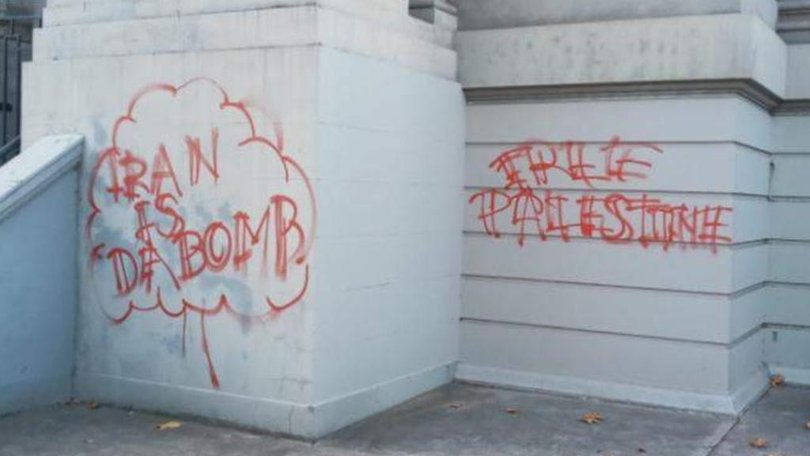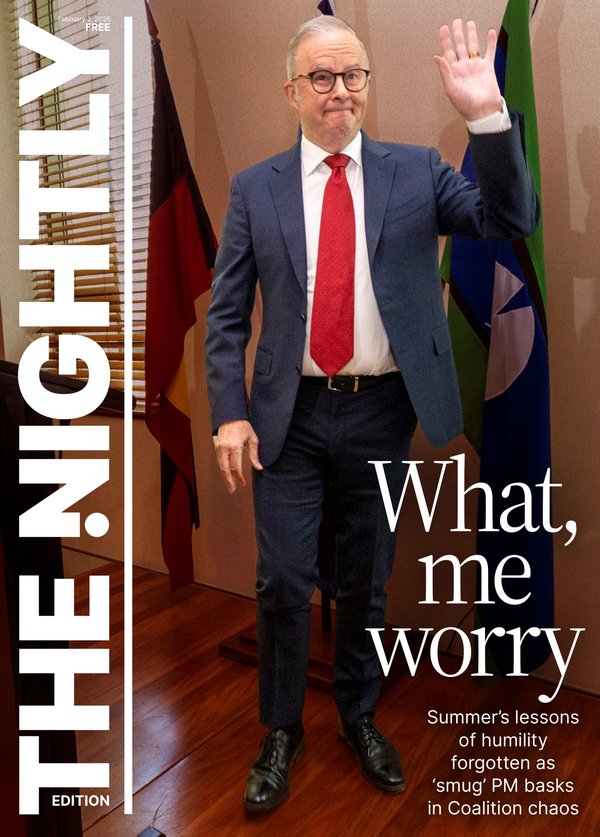Australia news and politics live: ‘Iran is da bomb’ sprayed on Melbourne synagogue hours after US raids
LIVE UPDATES: One of Melbourne’s most iconic religious buildings has been attacked by vandals twice in one day after the US launched bombing raids on Iran.

Scroll down for the latest news and updates.
Key events
23 Jun 2025 - 03:37 PM
Disgusting act of vandalism on Melbourne synagogue
23 Jun 2025 - 03:25 PM
Hastie hit out at Albanese on Israel-Iran silence
23 Jun 2025 - 01:36 PM
Alleged Israeli spy hanged in Iran as war stretches into 11th day
23 Jun 2025 - 12:56 PM
North Korea blasts US and Israel for ‘ceaseless war moves’ in Iran strike fallout
23 Jun 2025 - 11:22 AM
Australia’s DFAT issues warning of ‘risk of reprisal attacks’ over Middle East conflict
23 Jun 2025 - 10:47 AM
Trump boasts US strike on Iran hit ‘bullseye’
23 Jun 2025 - 10:25 AM
PM, Foreign Minister reveal concern over retaliatory attacks on Australia and allies
23 Jun 2025 - 10:16 AM
Albanese backs US strikes on Iran, urges de-escalation of conflict
23 Jun 2025 - 10:04 AM
Albanese refuses to answer whether Australia’s assets involved in the US strikes
23 Jun 2025 - 10:00 AM
Albanese avoids questions about whether strikes breached international law
23 Jun 2025 - 09:48 AM
Albanese hasn’t spoken to US President Donald Trump
23 Jun 2025 - 09:46 AM
Wong says Iranian embassy decision ‘difficult’ to make
23 Jun 2025 - 09:45 AM
Australia was not briefed before US bombed Iran
23 Jun 2025 - 09:21 AM
IDF intercepts new missile launch from Iran
23 Jun 2025 - 08:29 AM
Trump suggests ‘regime change’ could ‘Make Iran Great Again’
23 Jun 2025 - 06:20 AM
Wong confirms the US has not requested Aussie troops
23 Jun 2025 - 05:46 AM
Australia supports US strikes on Iran’s nuclear facilities: Wong
Albanese refuses to answer whether Australia’s assets involved in the US strikes
Anthony Albanese and Penny Wong have refused to answer questions around intelligence and Australia’s potential involvement in the US strikes on Iran.
When asked during a Canberra press conference on Monday whether or not there was any intelligence-sharing from shared Australia-US assets such as Pine Gap, he repeatedly responded to say it was a “unilateral action from the United States”.
“We are upfront, but we don’t talk about intelligence obviously,” he said.
“We have made very clear this was unilateral action taken by the United States.”
Albanese avoids questions about whether strikes breached international law
While Anthony Albanese has avoided questions about whether the US strikes on Iran breached international law.
During his first public remarks on the US action at a press conference in Canberra he was asked, “Can we clarify if you believe they were legal under international law?’”
But the Prime Minister didn’t directly answer.
“Well, Iran has an interest… an interest… in ensuring that there is not an escalation in the region and that is the incentive that they have,” he said.
“The United States have made clear their position and we continue to call for dialogue.
“Had Iran complied with the very reasonable requests that were made including… then circumstances would have been different.”
Albanese hasn’t spoken to US President Donald Trump
Anthony Albanese says he hasn’t spoken to his US counterpart Donald Trump since he ducked out of their scheduled G7 sideline meeting, despite being considered a close ally.
The Prime Minister held a press conference in Canberra on Monday after the US President revealed on Sunday AEST that America had struck three key nuclear facilities in Iran.
REPORTER: “Prime Minister, have you spoken to President Trump since the G7 summit?
ALBANESE: “No.”
It comes as the UK Government revealed it had been given the heads up of the strikes.
Wong says Iranian embassy decision ‘difficult’ to make
Senator Wong says the decision to close the Australian embassy in Iran was “a difficult decision to make” but not without precedent.
“The previous Government had to do it in Kyiv and in other parts of the world, it occurs from time to time. But I would say we were very conscious of the history in Iran which I think people will know, and the advice to me was to ensure we got our people out,” she said.
“Obviously the situation in Iran is very distressing for Australians.”
Australia was not briefed before US bombed Iran
Australia was not briefed before the United States bombed Iran, Prime Minister Anthony Albanese says.
Downing Street said UK Prime Minister Keir Starmer spoke to US President Donald Trump before the bunker-buster bombs were sent in, but Australia was given no such heads up.
“The UK has been one of the countries that’s been at the negotiating table with Iran for many years on its nuclear weapons program,” he said.
Pressed again, Mr Albanese said “this was unilateral action taken by the United States”.
PM says ‘no change’ to terror threat level
Asked if Australia was reviewing its terror threat level, Mr Albanese said there was “no change” in any advice at this stage.
“The ASIO Director-General and our security intelligence agencies are constantly engaged in monitoring,” he said.
Albanese ‘deeply concerned’ about escalation in the Middle East after the US strikes
Anthony Albanese says he’s “deeply concerned” about any escalation in the Middle East after the US strikes on Iran’s nuclear facilities .
He joins world leaders who are urging de-escalation as Iran mulls its response.
“We have been upfront about the challenge facing the international community - that is, dealing with the threat posed by any Iranian nuclear weapons program and dealing with the risk of regional escalation,” he said on Monday.
The United Nations Security Council has held an emergency meeting, saying its gravely alarmed by the use of force against Iran.
PM: Australia ‘not a central player’
Prime Minister Anthony Albanese said Australia is “not a central player” in this conflict, when asked why it had taken him more than 24 hours to respond to the US’ strikes on Iran.
“What we do is run an orderly, stable government. I made comments about this in three countries over recent days,” he said, referring to his travel last week.
“My comments today are perfectly consistent with that.”
Pressed again why he had taken more than a day to be so equivocal, Mr Albanese said the Government had “issued a statement yesterday”.
The statement that was released yesterday, attributable to a Government spokesperson, did not explicitly state whether Australia supported the US’ actions or not.
That language had hardened by Monday morning.
Albanese finally weighs in on US strikes on Iran’s nuclear facilities
Prime Minister Anthony Albanese has said Australia supports the US strikes on Iran’s nuclear facilities after he and senior Labor figures didn’t front the cameras following the historic strikes.
“The world has long agreed that Iran cannot be allowed to get a nuclear weapon and we support action to prevent that - that is what this is,” he said at a Canberra press conference on Monday.
“Iran didn’t come to the table just as it has repeatedly failed to comply with its international obligations. We urge Iran not to take any further action that could destabilise the region.”
PM and Wong to speak shortly
Prime Minister Anthony Albanese and Foreign Minister Penny Wong will address media shortly regarding the United States’ attack on three Iranian nuclear sites.
This comes following a National Security Committee meeting that was held on Monday morning.

